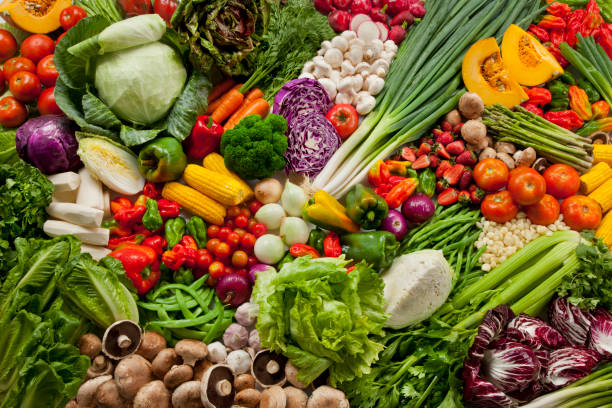Healthy eating habits can help prevent malnutrition in all forms.
Global health risks include unhealthy diets and inactivity.
Healthy eating habits start early in life. Breastfeeding promotes healthy growth and cognitive development. It may also have long-term health benefits, such as reducing your risk of developing NCDs or becoming overweight later in life.
The balance between energy intake (calories and energy expenditure) is essential. To prevent unhealthy weight gain, total body fat should not exceed 30%. Intake of saturated fats should be less than 10% of total energy intake, and intake of trans-fats less than 1% of total energy intake, with a shift in fat consumption away from saturated fats and trans-fats to unsaturated fats (3), and towards the goal of eliminating industrially-produced trans-fats (4, 5, 6).
Healthy eating habits include limiting the intake of sugars to 10% of total energy intake (see 2, 7). Additional health benefits can be obtained by reducing the intake of sugars to below 5% of total energy intake (7).
Salt intake should be less than 5 grams daily, equivalent to a sodium intake of less than two g/day. This helps prevent hypertension and lowers the risk of stroke and heart disease in adults (8).
WHO member states have committed to reducing salt intake by 30% by 2025. They also pledge to stop the rise in obesity and diabetes in children and adults by 2025 (9-10).
Overview
A healthy diet is essential throughout your life. It helps prevent malnutrition in all forms. However, the shifts in diet patterns have been caused by increased consumption of processed foods, urbanization, and lifestyle changes. Many people eat more high-energy fats, sugars, salt/sodium foods, and fewer fruits, vegetables, and other dietary fibers such as whole grains.
Individual characteristics such as age, gender, lifestyle, and degree of physical activity will affect the exact composition of a balanced, healthy diet. Unique factors (e.g., gender, lifestyle, degree of physical activity, cultural context, local foods, and dietary habits) will affect the composition of a balanced, healthy diet. The basic principles of healthy eating remain the same.
For adults
These are the essential ingredients of a healthy diet:
Fruit, vegetables, legumes (e.g., Lentils and beans, nuts, and whole grains (e.g., unprocessed maize and millet, oats or wheat, brown rice, and wheat
Minimum 400g (i.e., At least 400 g (i.e.
For additional health benefits (7), less than 10% of total energy intake is from free sugars. This is approximately 50g or about 12 level teaspoons for someone with a healthy body weight who consumes about 2000 calories daily. All sugars added to food or beverages by the consumer, manufacturer, or cook, including sugars found in honey, syrups, and fruit juice concentrates.
Fats account for less than 30% of total energy intake (1, 2, 3, 3). Unsaturated fats (found in fish, avocado, and nuts, and in sunflower, soybean, canola, and olive oils) are preferable to saturated fats (found in fatty meat, butter, palm, and coconut oil, cream, cheese, ghee, and lard) and trans-fats of all kinds, including both industrially-produced trans-fats (found in baked and fried foods, and pre-packaged snacks and foods, such as frozen pizza, pies, cookies, biscuits, wafers, and cooking oils and spreads) and ruminant trans-fats (found in meat and dairy foods from ruminant animals, such as cows, sheep, goats, and camels). It is recommended that saturated fat intake be kept below 10% and trans-fats under 1% of total energy intake. In particular, industrially-produced trans-fats are not part of a healthy diet and should be avoided.
Aim for less than 5g per day (the equivalent of about one teaspoon). Salt should be iodized.



